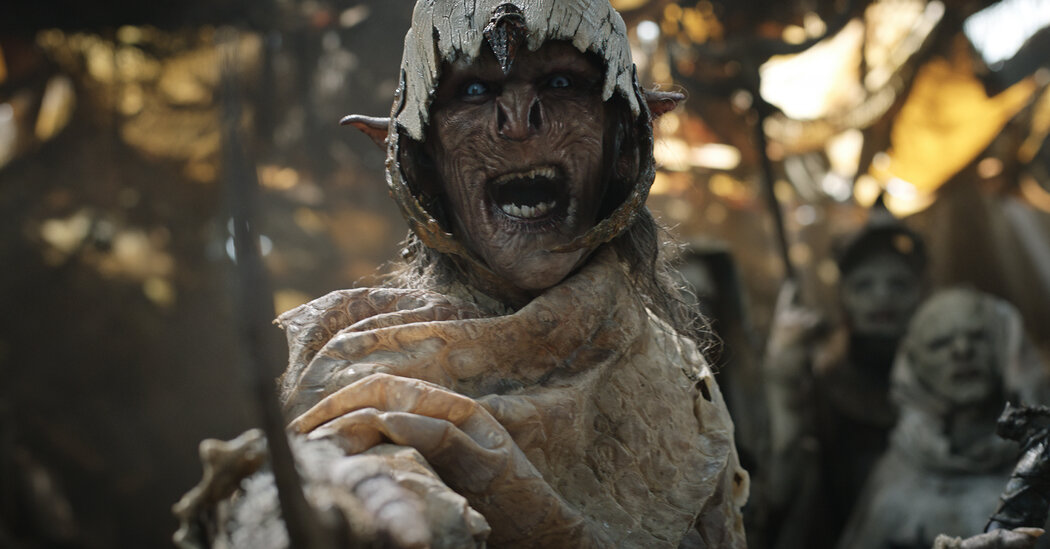
Practically since it was announced several years ago, Amazon’s expensive “Lord of the Rings” prequel series, “The Rings of Power,” has had many people predicting its doom. Indeed the series’s quest seems fraught with peril: It must win over a general audience and live up to the beloved Peter Jackson film trilogy of the early 2000s. And it must also satisfy grumpy Tolkien readers who have debated this material for decades. Stray but a little, as Galadriel might say, and it will fail.
With the first two episodes set to arrive on Thursday night (with new episodes streaming each Friday, starting next week), the reviews are pouring in. Is this latest TV mega-franchise a catastrophe or a triumph? Brilliant or boring? The misfire many predicted or the one show that will rule them all?
Read on for a range of opinions, along with other noteworthy recent features on the series.
‘Shiny, Not Yet Precious’ [The New York Times]
James Poniewozik, The New York Times’s chief television critic, writes that in the early going, the series “does not reinvent the ring.” It does, however, “add a few new filigrees,” he adds. “It immediately conjures the visual spell of the movies. More important, it manages, eventually and occasionally, to create its own swashbuckling, storytelling magic.” Some of those magic sparks come in the form of a “star-man,” who travels to Middle-earth via a meteor, and a nuanced portrayal of Galadriel: “A troubled, obsessed Carrie Mathison-like Galadriel may not be purely Tolkien,” Poniewozik writes. “But she is interesting.”
‘With “House of the Dragon” and “The Rings of Power,” We’ve Entered the Age of Blockbuster TV’ [The New York Times]
There are incredibly high expectations for big-budget fantasy shows not only to succeed, writes Ross Douthat, a Times opinion columnist, but also to set the direction for a new age of television: the age of Blockbuster TV. The challenge for “The Rings of Power” will be to humanize its epic sweep and spotlight characters the audience can identify with. The show “needs more politics and personality and nonmagical conflict,” Douthat writes. “There’s only so much you can do with sonorous elf talk.”
‘Please Don’t Make a Tolkien Cinematic Universe’ [The New York Times]
A scholar of Tolkien’s works, Dr. Michael D.C. Drout, is wary of the trend to create franchises out of literary works, particularly, in this case, without the deceased author’s knowledge or permission. If viewers are disappointed by the Amazon series, Drout predicts, it will because it lacks the “literary and moral depth” of Tolkien’s world. He asks, “Can a company as intent upon domination as Amazon really understand this perspective — and adapt that morality to the screen?”
‘Amazon’s Prequel Is Kind of a Catastrophe’ [Entertainment Weekly]
Is it a bad sign that the critic Darren Franich is rooting for the orcs? He dismisses much of the show as “dull,” “bland,” and “boring,” but he does hold out hope that future episodes will feel less like “Now That’s What I Call Middle-earth! karaoke.” For now, he frets about finding laughs where there aren’t supposed to be any — in the maps (“more funny than informative”), the special effects (almost “Monty Python”) and the plotting.
‘“The Rings of Power”’s First Episodes Only Skim the Surface of “Lord of the Rings”’ [Polygon]
Leon Miller finds that the first two episodes of the series “come up short,” despite being “impressively cinematic” with “bravura camera work.” “It’s all terrific, but it’s all so familiar, too,” he writes. Expanding on Tolkien’s mythos and punching up the show’s clunky dialogue would help matters: “Language was a big deal for Tolkien; he was an Oxford don who didn’t just study languages, he invented his own for fun.”
‘Staring Down the Trolls: What’s Really Behind the Battle Over “The Rings of Power”?’ [The A.V. Club]
Debates about diversity and inclusivity in “Lord of the Rings” tend to attract trolls, and Cindy White says that outrage brokers who want the series to fail are using it to advance their own agendas, “from mainstreaming alt-right ideologies to the monetization of anger for clout.” A tip-off? “Look for inflammatory statements in ALL CAPs and words like ‘woke,’ ‘SJW,’ and ‘normies’ used in the pejorative sense,” she writes.
‘Many Predicted Amazon’s “Lord of the Rings” Prequel Would be a Disaster. It Isn’t.’ [The Los Angeles Times]
The critic Robert Lloyd thinks the series fits into a gray middle area, “neither a disaster nor a triumph,” adding that he feels that casting actors of color and foregrounding female characters, particularly Galadriel (played by Morfydd Clark), benefit the show. The only potential downside is, when depicting fantasy-world racism, the series decides to “too obviously adopt the language of modern American prejudice to make a point.” But that, he says, is “a matter of poor writing rather than a bad idea.”
‘“The Rings of Power,” Sweeping and Gutsy, Makes the Most of Its Ample Lore (And Amazon Budget)’ [Variety]
Variety’s chief TV critic, Caroline Framke, sees beauty in how the series balances so many disparate characters and story lines, like spinning plates: “When one threatens to come crashing down, the show can simply move on to the next until it’s ready to pick up where it left off.” The steadiest of those plates, though, remains Galadriel. Also, for those wondering if the show is safe for kids to watch, she determines, “Yes, as long as they can handle war and/or the occasional orc jump scare.”
‘A Spectacularly Cinematic Return to Middle-earth’ [The Independent]
“It’s a spectacle-filled return to a lovingly rendered Middle-earth,” Kevin E.G. Perry writes. Despite the promise of an “awfully big adventure,” he thinks one of the best parts of the show is something — or someone — small: the proto-hobbits known as the Harfoots. “It’s the Harfoots that really make ‘The Rings of Power’ work,” he writes. “These pastoral scenes manage to capture the magic of the late-80s BBC version of ‘The Chronicles of Narnia.’”
‘Amazon’s “The Lord of the Rings: The Rings of Power” Is Small-Screen High Fantasy Done Right’ [The Verge]
Some might take issue with the show’s initial pace, but the writer Charles Pulliam-Moore sees it as “a very effective way of illustrating how elves experience and perceive time very differently than other races who aren’t as long-lived.” Also, the elves are now presented more as “complicated, flawed people,” rather than as mysterious beings. And despite the enormous computer-generated expenditures in evidence, Pulliam-Moore most appreciates practical effects like the hide-y holes at the Harfoot encampment, which provide “some of the series’ most truly magical moments.”
‘Amazon’s “Lord of the Rings” Series Is Absolutely Stunning — and Puts “House of the Dragon” to Shame’ [The Daily Beast]
The critic Nick Schager admires how the show incorporates beloved characters — particularly Galadriel (“the soul of “The Rings of Power”) — while also establishing stunning new kingdoms. But it’s the show’s carefully calculated tone that he most admires — a “balance between the glorious and the vile, the romantic and the brutal, the euphoric and the despairing, and the grand and the intimate.” This is “fantasy writ exhilaratingly large,” Schager writes, concluding that it “feels fresh and alive.”
‘“The Rings of Power” Is Too Big to Fail’ [Vulture]
The show is big, Kathryn VanArendonk writes, too big for the small screen, too big to be a failure, too big to be ignored, too big, perhaps, even to be mocked. (“Its emotional core, though simplistic, is just as big and openhearted.”) The brute force of its size also raises some existential questions: “At what point is a television show so big and so uninterested in being TV-shaped that it essentially makes it another species?”




